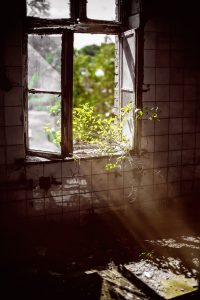I have spent a lot of the last two weeks on the telephone, calling members of the church to see how they are during the Covid-19 crisis. What I have discovered is both encouraging and humbling. There is some worry and frustration, but very little fear or despair. Most people are taking the threat of the virus and the accompanying lockdown with patience; and one remark has been made again and again, in various forms. That is that people are coming to understand what really matters, and learning to appreciate the little things in life: a conversation with a friend, sitting in the garden in the sunshine, playing with their children, or drinking a glass of wine. If Covid-19 is making us less greedy, and more contented, then this can only be a good thing; and yet I think that there is a danger than comes with this.

In one of his essays entitled “Meditations in Toolshed”, CS Lewis tells of an experience he had one afternoon in a toolshed in his garden. The shed was dark, but a beam of sunlight came through a crack in the door. This beam was, Lewis says “the most striking thing in the place”, and his attention was fixed on it. Then he moved, and could no longer see the beam itself, but he could see through the crack in the door, into the garden beyond, and millions of miles beyond it, to the sun. This led Lewis to make a distinction between looking at something, and looking along something.
This I think is the danger that we may face in our new-found contentment, and appreciation of our favourite things: that we look at them, and not along them. So we may sit in our garden, content to feel the warmth of the sunshine and the cool of the breeze; we are in this way looking at the sunshine and the breeze. But we do not look along the sunshine and the breeze to their maker. This danger has faced us ever since the Eden. Adam and Eve were given a garden to enjoy; but it was not supposed to be their ultimate resting place. Instead, it was supposed to point them to the maker as the source of all blessing and happiness, and to a higher kind of life with him as their final rest. When the Lord God gave the land of Canaan to the Israelites, he warned them that they might become so enamoured of the gift that they would forget the giver, (see Deuteronomy 6). So in Romans 1:18-25, the Apostle Paul depicts the genesis of human sin as a failure to glorify and give thanks to God for the goodness that was evident in the created world. In all these cases, misplaced contentment is as dangerous as greed.
So while it is good to enjoy our favourite things, we need to learn to look along them, and not merely at them. That is to say, we need to learn the art of meditation. The great masters of this were the Puritans. Meditation was for them first of all on the Bible; this was the sun from which they received the light in which they beheld everything else. Having received that light, they could shine on the world around them, and make all of creation, including their favourite things, material for meditation. As they did this, they were looking along the world, and not merely at it; they will following every beam of goodness, every glimmer of pleasure, back to its source in the great happiness of God, in whose presence there is joy, and at whose right hand there is pleasure for evermore, (Psalm 16:11).
So in our present trial, we might meditate on Covid-19. If we only look at it, we will only feel horror and fear. But if we look along it, in the light that the Bible sheds on it, it will lead us to think about our sins, and about God’s judgement; it will lead us to repentance. This is good. But then we will meditate on our pleasures as well, upon the little things we enjoy. If we only look at them, we will simply enjoy the moment; if we look along them, the little things will lead us to thanksgiving. A garden will speak to us of the garden of Eden from which we are all exiled, and of the garden-city of God in which we will find our final rest. The delight we have in our children will lead us to think of the delight that God has in us as his children. Our love for our wife or husband will draw us to the love between Christ and his church. A glass of wine will taste of Christ’s blood shed for our salvation, and of the rich, well-aged wine that we will drink with Christ in the Kingdom of God. The little things will lead us to great things, and to the great giver, and to the final Sabbath rest of God.

